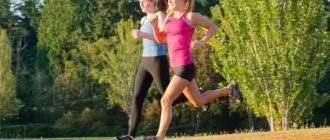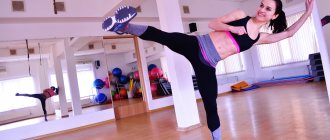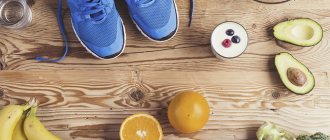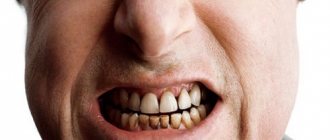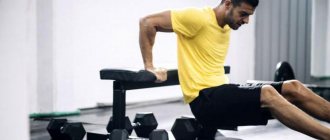Well-known trainer and nutritionist Russell Bateman, fitness trainer Evgeny Shorokhov and many others agree that training on a full stomach is harmful and even dangerous to health.
A period of time is required between meals and classes, which depends on what exactly was on the menu.
It's time to figure out how long after eating you can effectively and safely exercise.
What happens to the body after eating
After eating, the “mood” hormone, serotonin, appears in the body. It participates in metabolic processes, affects blood clotting, normalizes sleep and rest, and slows down the aging process. It also causes some drowsiness.
A feeling of fatigue also sets in, as the body spends a lot of energy digesting food for some time.
And when a person is hungry, the brain produces orexins. This substance does not allow a person to sleep, but forces him to go in search of food. After eating, orexins do not enter the bloodstream, and the person begins to feel sleepy.
Be sure to check out: Simple recommendations from famous trainers on what to eat before a workout to lose weight What to eat before a workout: recommendations from experts What is the best thing to eat after strength training and cardio to burn fat What and how long can you eat after a workout
What to eat after class?
During physical activity, you expend a lot of energy, and you need to replenish it, and do it correctly. You can find recommendations that you can eat only 3-4 or more hours after classes. This is supposedly explained by the fact that eating food before this period will provoke a decrease in the effectiveness of the exercise.
Actually this is not true. The right food will go into muscles, not fat. You can have a snack half an hour after class. This will make it possible to activate recovery processes, and all nutritional components will be used usefully without being transformed into fats. In practice, most athletes can confirm that if you do not eat for two or more hours after training, its intensity decreases.
This also has its own explanation. The body will strive to restore energy balance, but it will not receive food. In view of this, catabolic processes are activated. Experts recommend consuming carbohydrates. There are also foods that you should avoid for a certain time after training:
- Fats, because they slow down the delivery of carbohydrates into the bloodstream.
- Caffeine-containing products that increase insulin concentrations and thereby slow down glycogen synthesis in the liver and muscle tissue. Therefore, those who like to drink a cup of coffee after training are better off waiting.
Is it possible to exercise if you have just eaten?
Coach Daria Zhichkina says that under no circumstances should you train on a full stomach. The blissful state after eating in itself makes a person relax and rest a little. The training will not have the desired effect. And the digestive process will be disrupted, and exercise will not lead to anything good.
Exercise slows down digestion if done immediately after eating. The body requires strength and blood flow to digest, but it has to share with the muscles.
Interesting! In a calm state, only one-fifth of the total blood volume passes through the muscles, and during exercise the volume increases many times over.
When blood is redirected to the muscles during exercise on a full stomach, people feel unwell and others may experience cramps. And in some sports, an overfilled stomach is also dangerous. For example, in swimming, rock climbing.
Rules and intervals of nutrition during physical activity
Professional fitness trainer Evgeny Shorokhov offers several diet options and time intervals between classes.
How much time to eat before training depends on what kind of goal the person is pursuing. When reducing the percentage of fat and muscle tissue you need to:
- Three to four hours before exercise, eat vegetables, drink juice, and avoid protein foods.
- 40 minutes before class you can indulge in sweet tea, coffee, cocoa, and eat fruit.
- Three hours after class, stop eating altogether.
- You need to eat 5-6 times a day.
- When the training took place in the first half of the day, for 10 hours you can only allow yourself fruits and vegetables.
- For lunch, eat protein foods and fats.
- In the afternoon - fruits, dried fruits, in the evening, to lose weight - vegetable proteins and vegetables.
Well-known fitness trainer Anita Lutsenko is convinced that no starvation diets will help if you set a course for slimness. You need to eat right:
- It is better to eat food one and a half to two hours before training, and then eat an hour and a half after training.
- Before training, the best food will be carbohydrate (it is easily digested and gives strength), and after training - protein.
When to eat and exercise to lose weight
The rules for eating for weight loss, according to trainer Evgeniy Sholokhov, are as follows:
- You need to eat five hours before training, fully provide yourself with the norm of proteins, vitamins and fiber, and you can drink as much water as you like.
- Half an hour before class, drink juice or another sweet drink, and eat 200 grams of fruit.
- 2 hours after training, eat 100 grams of protein, for example, low-fat cottage cheese.
- In the case of an evening workout, you need to eat some fruit and milk in the evening. And don’t overeat, because at night food is absorbed faster and fat is stored.
With this approach, the thickness of the skin folds will decrease and the figure will become toned.
How long before weight training in the gym should you eat?
You need to eat a couple of hours before strength training. During this time, protein food has time to be digested. Protein-carbohydrate foods require 3-4 hours to digest. But this is an average.
If a person eats fractionally and in small doses, you can eat an hour and a half before exercise, but when you have to eat three times a day and eat heavily, it will take 3-4 hours.
Should I pause before cardio training?
Cardio training lasts no more than 30 minutes, with heart rate increasing up to 150 beats per minute during exercise. At this time, active breakdown of fat occurs. After exercise, the body will restore them either through food or through subcutaneous fat.
To avoid ravenous hunger, you need to eat an hour before class. The menu should consist of easily digestible proteins - cottage cheese, milk. They will supply the body with the necessary amino acids. And also carbohydrates, which will provide full energy.
Attention! With high-intensity cardio, carbohydrates will interfere; such exercises are recommended to be done on an empty stomach.
Should you have breakfast before exercise?
Before exercising, you need to have breakfast, this will give you strength. When you have a strong desire to eat, especially after waking up, you need to allow yourself to do so. Will not damage fruits and dried fruits. It will take no more than 20 minutes to digest them in the stomach. And then you can start doing exercises, without fear of the consequences. Read more about breakfast before training.
Is it possible to exercise after eating?
Pre-workout meal planning is a hot topic in fitness circles. No one can give a definite answer. Firstly, each type of training has its own rules. What works for strength training won't work for yoga. Secondly, each person is individual and it is necessary to experimentally search for the optimal time. In this article we will give basic rules and guidelines on how to plan your last meal before sports activities.
Is it possible to exercise immediately after eating?
Fitness trainers are unanimous in their opinion that you should not exercise after eating. Any product needs time to be absorbed. A large meal, such as breakfast, lunch or dinner, takes longer to digest – 2-3 hours. A light protein-carbohydrate snack, like an apple and a protein shake, will be digested faster - 45-60 minutes. At different times of the day, foods are absorbed differently. Digestion of food occurs faster at lunchtime - from 12:00 to 15:00. In the morning and evening, the rate of digestive enzymes is low.
After eating, blood rushes to the stomach, and during sports, the muscles need it. Physical activity after eating puts a lot of stress on the digestive system. During training, you may feel heaviness in the stomach, drowsiness, weakness, nausea, and spasms of the gastrointestinal tract.
Focusing on the basic rules of meal planning before sports and your own feelings after eating, you can find the optimal time.
Nutrition rules before strength training
Before strength training in the gym, you need to eat 1.5 hours in advance, if we are talking about a full meal of complex carbohydrates and lean sources of protein. If your last meal took place 3-4 hours ago and there is no time to wait, make a light snack 30-45 minutes before training from quickly digestible foods (calorizer). Cottage cheese with berries or an omelet with vegetables and bread would be an excellent option.
After training, there is no need to rush to the refrigerator or snack on some special foods. Eat your regularly scheduled meal 45 to 60 minutes later.
Nutrition rules before cardio training
Before cardio training, you need to eat 1.5-2 hours. This applies to all meals. There is no need for snacks before cardio (calorizator). An exception is if you feel hungry, make a light snack of 150-200 kcal in 30-45 minutes. Choose protein products - a protein shake, an egg white omelet, a glass of yogurt.
High-intensity cardio is subject to the rules of nutrition before strength training. During HIIT, the body works in an anaerobic mode, and not in an aerobic mode, as with classic cardio on a machine.
After cardio training, you need to eat 45-60 minutes later. After completing the workout, the body continues to burn fat for some time. Food will stop the process of burning calories.
Nutrition rules before yoga or Pilates
A long period of time is needed between meals and yoga, Pilates or dancing - 2 hours after a light snack and 4 hours for a normal meal. Yoga instructors believe that eating in less than 2 hours will disrupt the flow of energies, but they agree that if you feel physiological hunger and the inherent weakness, then you need to have a light snack.
On average, 40-60 minutes after a quiet workout, eat your planned meal.
All of the above recommendations are averages. The period of time may vary depending on the individual characteristics of each person. Focus on the proposed ranges and adjust your meal times so that during exercise you do not feel either heaviness in your stomach or hungry weakness.
Author: Ekaterina G., nutritionist, fitness blogger (especially for) Copying this article in whole or in part is prohibited.
Features of nutrition before training at different times of the day: morning, afternoon and evening
Trainer and nutritionist Russell Bateman believes that consuming fructose before exercise is not the best solution. That is, no bananas and cola.
The ideal pre-workout snack is organic coffee, coconut oil and 5 almonds. And a complete breakfast in the morning, in order to lose weight, should contain proteins in the form of eggs, salmon or meat.
During the day, you can add fermented foods obtained during fermentation to your diet:
- sauerkraut;
- kefir;
- salted cucumbers;
- products with probiotics.
They enhance the effect of physical activity.
And in the evening you can indulge in meat or fish with vegetables. But 2-3 hours before classes. After training it would be nice to take a walk. And go to bed no later than 10 pm.
You may also be interested in: Fitness nutrition: training, losing weight, enjoying food
How soon can you eat after training?
General tips for pre- and post-workout nutrition
The effectiveness of exercise directly depends on your diet.
How to properly organize sports nutrition
Dietary recommendations:
- The amount of water per day is at least 1.5-2 liters.
- The menu 3 hours before training should include about 350 kcal.
- 1 hour before the start of classes, the number of calories should not exceed 150 units.
- 20 minutes after exercise, you need to close the “carbohydrate window” with kefir, yogurt or unsweetened juice.
- After fitness, you need to give preference to proteins and complex carbohydrates.
Even during a diet, nutrition needs to be balanced, because a lot of energy is expended during sports.
Main conclusions
Exercising immediately after eating is harmful and does not make sense for losing weight and getting in shape; you should wait a while.
Reasons why you should not eat immediately before training:
- after eating, the body produces special hormones that relax and put you to sleep;
- The body spends a lot of energy on digestion; it takes time for the influx of new energy;
- the body cannot simultaneously efficiently perform two functions: digestion and movement.
If you wait the required interval from 20 minutes to 2-3 hours after eating, then the efforts from exercise will give an excellent result in the form of a beautiful and toned figure.
How many hours after training can you eat?
Beginners do not always know how many hours after exercise they can eat.
When can you eat after training if you are losing weight?
Eating after a workout should occur in the first half hour, as the body has a strong need for nutrients. You can eat the following foods after training:
- low-fat protein shake;
- low-fat cottage cheese with fruit;
- omelette with bread.
The amount of energy received should be 2 times less than the energy spent.
What to eat after class
After exercise, food should consist of 60% carbohydrates (vegetables and fruits). Muscle recovery requires about 15 g of protein.


